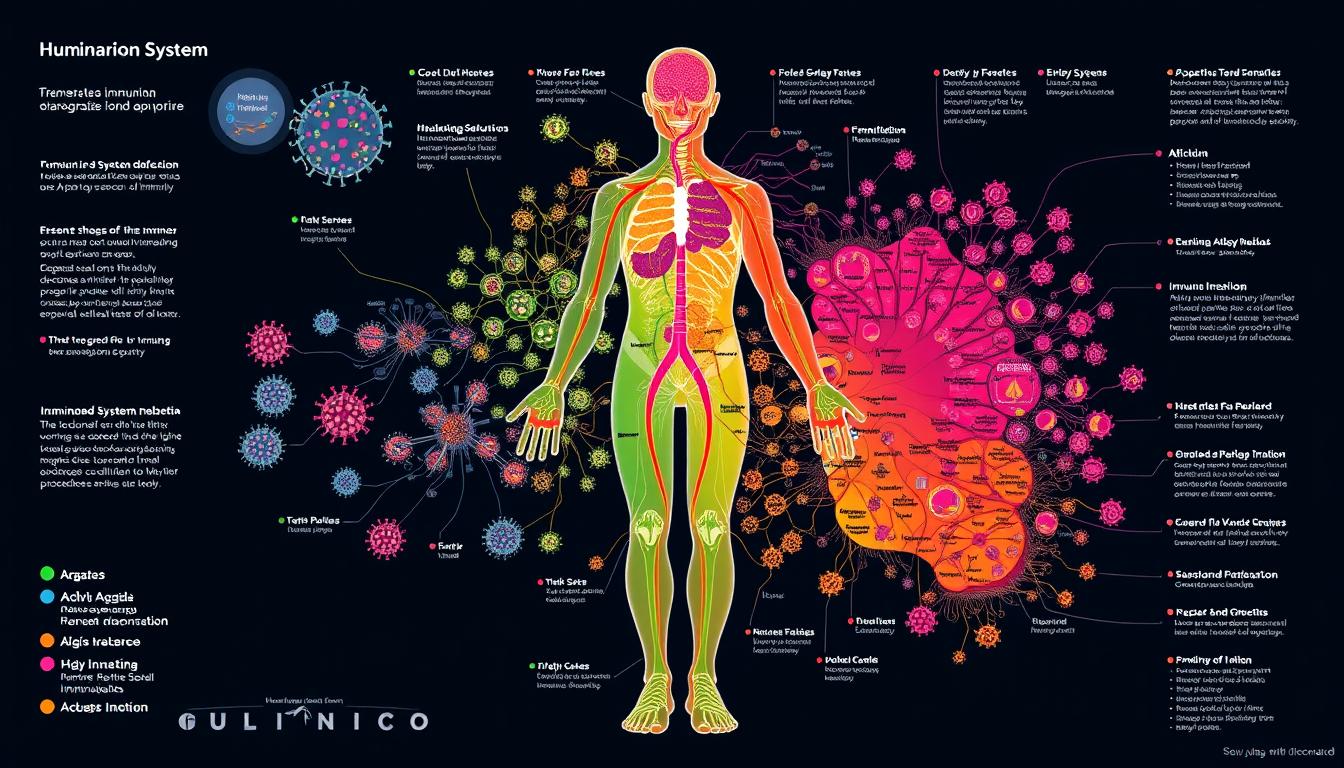As we get older, our Immune System Map changes a lot. This can make vaccines less effective. Researchers have found a way to map these changes. They think this could lead to better, more personalized vaccines.
They want to use this knowledge to make vaccines work better for everyone. This includes older adults who often don’t respond as well to vaccines. By understanding how our immune system ages, they aim to create more effective vaccines.
The main goal is to use what we know about immune system changes to improve vaccines. They’re looking for specific markers and pathways in aging. This way, they can make vaccines that work better, especially for older people.
Read More: Music After Surgery: A Natural Painkiller
Read More: Earth Now Gaining Less Heat: A Climate Shift
Mapping the Immune System’s Age-Related Changes
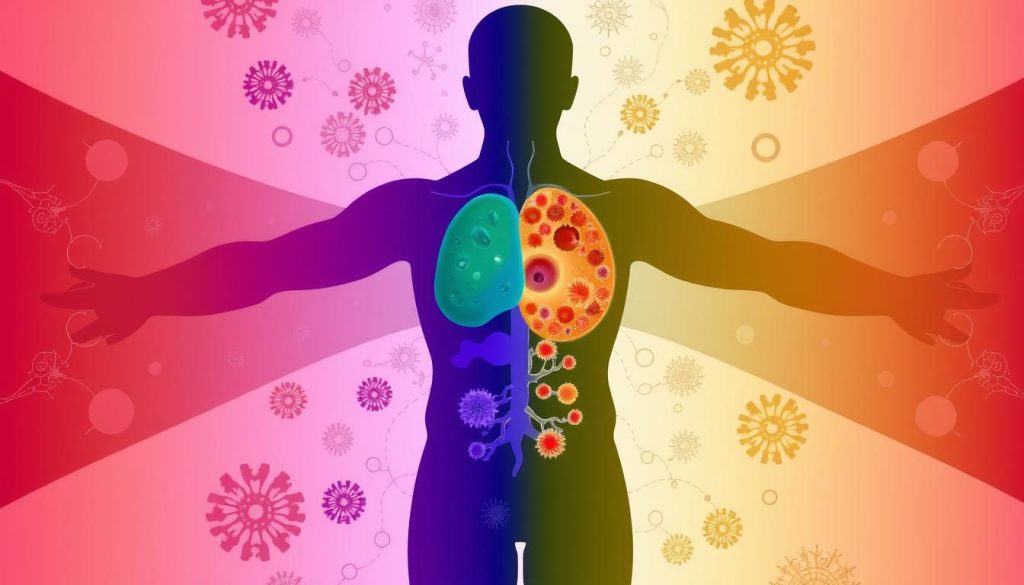
As we age, our immune system changes a lot. This is called immunosenescence. Scientists are studying these changes to understand how our immune system works as we get older. They want to know how these changes affect how well vaccines work.
Understanding Immunosenescence
Immunosenescence is when our immune system gets weaker with age. It happens because some immune cells, like T cells and B cells, decrease in number and function. By studying this, scientists hope to create better vaccines for older people.
Biomarkers of Immune Aging
Researchers are also looking for signs of immune aging. These signs, or biomarkers, can show how well our immune system is working. Finding these biomarkers can help make vaccines more effective for older adults.
Understanding how our immune system changes with age is key. Finding important biomarkers helps make vaccines work better for all ages. This research is important for keeping people healthy as their immune system ages.
Enhancing Vaccine Efficacy Through Precision Immunology
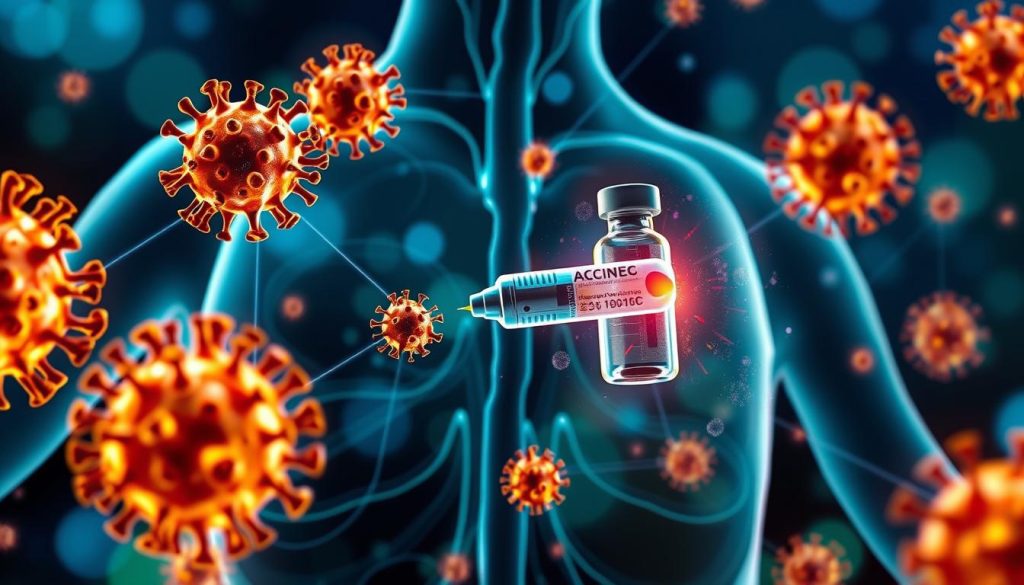
The field of vaccine development is changing fast. Precision immunology is leading this change. It helps us make vaccines that work better for each person, thanks to our growing knowledge of the immune system.
By understanding how the immune system changes with age, we can make vaccines that fit each person’s needs. This makes vaccines more effective. It helps people of all ages get the most from their vaccines.
At the core of precision immunology is making vaccines work better. We tailor vaccines to match each person’s immune system. This leads to stronger and longer-lasting protection against diseases.
This approach is key to overcoming the challenges of aging. It helps us make vaccines that work well for everyone, no matter their age. Precision immunology is unlocking the full potential of vaccines.
Age-Tailored Vaccine Strategies
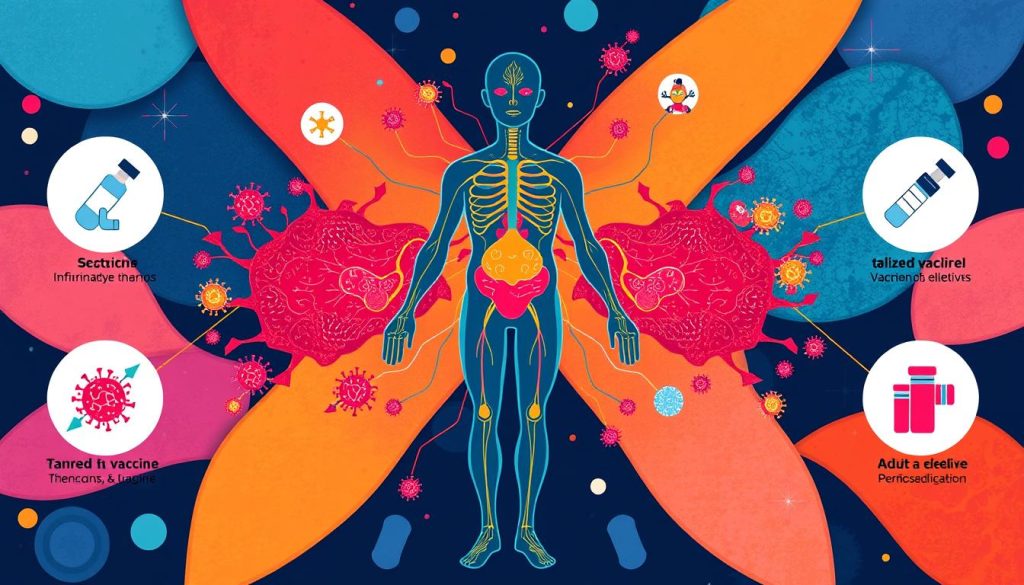
Researchers are working on new vaccine strategies. They aim to improve how well vaccines work. This includes making vaccines that fit each person’s immune system better.
Personalized Vaccine Approaches
Using precision immunology, we can make vaccines that match age-related immune changes. These vaccines consider each person’s immune profile. This ensures they work best for everyone, no matter their age.
This new way of making vaccines means they won’t be the same for everyone. It’s a big step towards better protection for people of all ages. This change could greatly improve our health and well-being.
Map of the immune system changing with age may help optimise vaccines
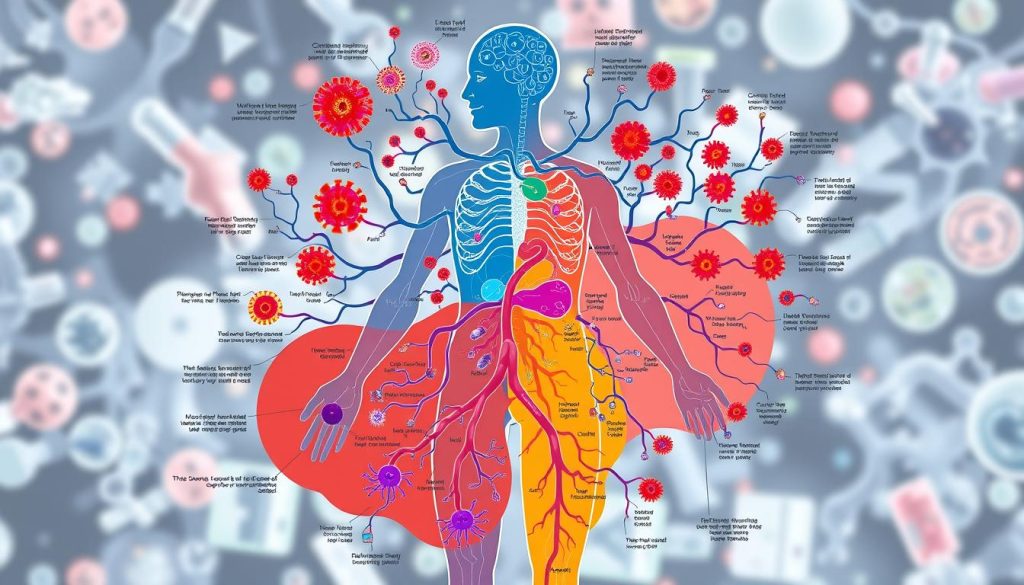
As we get older, our immune system changes a lot. This is called immunosenescence. Scientists are working on making vaccines that fit better with our age. They hope this will make vaccines more effective and protect us from many diseases.
The way our immune system works changes with age. Some parts of it don’t work as well as they used to. By knowing this, researchers can make vaccines that are better for older people.
By studying how the immune system changes with age, vaccine makers can improve their work. They can make vaccines that are just right for each person’s age. This could mean better protection for older adults, who often have weaker immune systems.
Using new insights from studying the aging immune system, we can make vaccines better. This could lead to better health for everyone, especially older people. It’s a big step towards fighting age-related diseases.
Harnessing Immunological Biomarkers for Vaccine Development
Researchers are finding many immunological biomarkers that help predict vaccine success. These biomarkers change with age, helping scientists create vaccines that work better and last longer. They make vaccines that fit each person’s immune system.
Identifying Predictive Markers
We’re getting better at finding key biomarkers for vaccine response. These markers show how the aging immune system reacts to vaccines. They help us make vaccines that work better for everyone, no matter their age or health.
Understanding the immune system better is key to making vaccines more effective. Using biomarkers, we can make vaccines that fit each person’s needs. This leads to better health for everyone, making our world stronger and healthier.
Overcoming Age-Related Immune Challenges
As we get older, our immune system changes a lot. It becomes harder for our bodies to fight off diseases well. This is called immunosenescence, and it’s a big problem for health.
Scientists are working hard to find ways to beat this. They want to make vaccines that work for people of all ages. This is very important for keeping everyone healthy.
They’re studying how our immune system changes with age. By learning about these changes, they can make vaccines better for older people. This means each person can get a vaccine that really works for them.
They’re also looking for signs that show how well someone’s immune system is aging. This way, doctors can give the right vaccine to each person. This makes the vaccine work better for older people.
It’s a big challenge, but scientists are making progress. They’re using new ways to understand our immune system. This could lead to vaccines that protect everyone, no matter their age.
Vaccine Efficacy and the Role of Immunosenescence
As we get older, our immune system changes in a natural process called immunosenescence. This can affect how well vaccines work. It’s important to think about this when we give vaccines to older adults.
Improving Vaccine Responses in Older Adults
Scientists are working hard to make vaccines more effective for older people. They want to understand and fix the immune system changes that come with aging. This way, they can create vaccines that work better for older adults.
They’re looking for signs that show how well someone’s immune system is aging. This helps them make vaccines that fit each person’s needs. With this knowledge, doctors can make sure vaccines work best for older adults.
It’s very important to deal with how aging affects vaccine success. Older people are more at risk for diseases and might not get as much protection from vaccines. Thanks to new research, we’re getting closer to making vaccines that work better for older people. This could really help their health and happiness as they age.
Precision Immunology: The Future of Vaccine Optimization
Precision immunology is changing how we make vaccines. It uses our knowledge of the immune system to create vaccines that work better for each person. This means we can fight diseases more effectively.
This new field is making vaccines better. It looks at how each person’s immune system works. This way, vaccines can be made just for them, giving stronger protection against sickness.
It’s a big step forward because it helps with the immune system’s decline as we age. This decline, called immunosenescence, makes older people more vulnerable to diseases.
By combining precision immunology with advanced data, we can find signs of how well someone will react to a vaccine. This lets us make vaccines that work better for older people and others at risk.
The future of vaccines looks bright with precision immunology. We can make vaccines that fit each person’s needs. This will lead to better health for everyone.
Navigating the Complexities of Immune System Aging
As we get older, our immune system changes a lot. This makes it hard to create vaccines that work well for everyone. We need to understand how the immune system ages to make better vaccines for older people.
By focusing on the immune changes that happen with age, we can find new ways to make vaccines stronger. This will help keep the elderly safe from diseases.
Targeting Age-Specific Immune Pathways
The aging process affects our immune system in many ways. For example, T cells don’t work as well, and cytokine production changes. It’s important to know these changes to make vaccines that work well in older adults.
Scientists are working on new ways to use the aging immune system. They want to create vaccines that fit each person’s needs. This could lead to better protection for everyone, no matter their age.
Understanding immune system aging and age-specific immune pathways is key. With new vaccine development techniques, we can make vaccines that work better for all ages. This will help keep everyone safe and healthy.
Leveraging Immune System Maps for Vaccine Potency
Researchers are using maps of the immune system to make vaccines stronger. They aim to create vaccines that work better, even as we age. This helps our bodies fight off diseases more effectively.
As we get older, our immune system weakens. This makes it harder for our bodies to fight off infections. By understanding these changes, we can make vaccines more powerful.
Scientists are looking at how to use signs of aging in the immune system to predict how well vaccines will work. This could help make vaccines more effective for older people. It’s a step towards keeping our aging population healthy.
Using maps of the immune system’s changes with age can make vaccines more effective for older adults. This is important because older people are more at risk of getting sick. By making vaccines better suited for aging bodies, we can keep our immunization efforts strong.
Advancing Personalized Vaccine Development Strategies
The future of vaccines needs a personalized touch. This approach considers each person’s unique immune system and how it changes with age. By using what we know about aging and predictive biomarkers, we can make vaccines that work better and are safer.
As we get older, our immune system changes a lot. It’s important to make vaccines that fit the needs of older adults. Personalized vaccines target the right immune pathways for older people. This ensures they get the best protection against diseases.
Using the latest in precision immunology can unlock vaccine development’s full potential. This method helps us find the best biomarkers for predicting how someone will react to a vaccine. With this information, we can create vaccines that fit each person’s immune system perfectly. This opens the door to more effective and safe vaccines for everyone.

